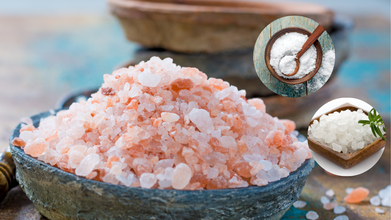- Health Conditions A-Z
- Health & Wellness
- Nutrition
- Fitness
- Health News
- Ayurveda
- Videos
- Medicine A-Z
- Parenting
- Web Stories
This Unpopular Fruit Can Lower Cholesterol, Blood Pressure And Blood Sugar Levels

Image Credit: Canva
It was only when my grandmother, a lifelong proponent of simple and clean eating, convinced me to try okra that I truly understood its benefits. Growing up, okra always seemed like an acquired taste—slimy when overcooked, its texture wasn't the most appealing. But as I delved into the world of nutrition, I realized this humble green pod isn't just a culinary curiosity; it's a powerhouse of health benefits.
Okra, a flowering plant, is renowned for its edible seed pods and thrives in warm, tropical regions like Africa and South Asia. Interestingly, while commonly treated as a vegetable in cooking, okra is botanically classified as a fruit due to its seeds. Beyond the pods, the entire plant is versatile, with its leaves, buds, flowers, stems, and seeds being fully edible.
Functional foods are those that provide health benefits beyond basic nutrition, and okra's profile is rich in polysaccharides, fiber, and antioxidants, which makes it well within the category that helps in disease prevention and wellness as a whole.
Cholesterol Control
Cholesterol is a necessary component of your body's functioning-it is used in the production of hormones, vitamin D, and digestive substances. But excess cholesterol, especially low-density lipoprotein (LDL), can cause chaos to your arteries. When LDL combines with other substances in the blood, it forms plaque-a sticky residue that lines the walls of the arteries-leading to a condition called atherosclerosis. This can escalate into coronary artery disease, increasing the risk of heart attacks and strokes.
Okra is an excellent natural remedy for managing cholesterol levels because of its nutrient profile compared to other vegetables such as spinach or broccoli that lack the combination of cholesterol-binding fiber and LDL-reducing polysaccharides, which okra offers. Polysaccharides are complex carbohydrates, making okra helpful in lowering LDL cholesterol. Another major component of okra is fiber that binds to cholesterol in the digestive system and prevents its absorption into the bloodstream.
A small study with type 2 diabetes patients showed that consuming 10 grams of okra powder mixed with yogurt greatly lowered LDL levels and inflammation markers such as C-reactive protein. Adding okra to your diet is a step towards healthier arteries and a stronger cardiovascular system.
Ally for Hypertension
The pressure of blood against the artery walls is known as blood pressure. High blood pressure, also termed hypertension, has been called the "silent killer" because it often develops without noticeable symptoms until severe complications arise. Blood pressure management is a delicate balance between lifestyle changes and dietary factors, with fiber being very important.
Okra contains high amounts of fiber and is double-beneficial. It does not only contribute to digestive health; it also supports the elasticity of blood vessels and smooths the flow of blood, improving blood pressure. A direct relationship has been established through several studies, including one review from 2023 published in Cureus, that more fiber intake lowers blood pressure readings. Other vital nutrients found in okra, such as magnesium, are also helpful for maintaining normal blood pressure levels.
Okra has a single serving that provides 14% of the daily recommended value of magnesium. For every 100 milligrams increase in magnesium intake, there is a 5% reduction in the risk of hypertension.
Partner in Diabetes Management
For the diabetic patient, blood sugar control is a constant concern. Okra's unique composition has added value to a diabetic diet because it contains polysaccharides and flavonoid antioxidants that slow down the absorption of sugar in the blood. This mechanism prevents high peaks in blood glucose, which are especially damaging to people with diabetes.
Clinical studies prove the role of okra in glucose management. In one study, patients with type 2 diabetes who received powdered okra, 1,000 milligrams, in three divided doses for three months showed a highly significant increase in long-term blood sugar compared to the placebo group of patients who didn't incorporate okra in their diets. The vegetable's fiber is also a reason for more effectiveness because the sugar absorbs slowly in the bloodstream.
Okra Nutritional Value
Okra’s health benefits are deeply rooted in its rich nutritional profile. A single cup of cooked okra provides:
- Calories: 35.2
- Fiber: 4 grams
- Vitamin C: 26 milligrams (29% of the Daily Value)
- Vitamin K: 64 micrograms (53% of the Daily Value)
- Magnesium: 57.6 milligrams (14% of the Daily Value)
- Folate: 73.6 micrograms (18% of the Daily Value)
Vitamin C is a powerful antioxidant that promotes immune function and maintains healthy skin. Folate is involved in cell growth and is especially important during pregnancy because it helps in the development of the fetus's brain. Stress management and maintaining blood sugar levels are important functions of magnesium.
Potential Risks of Consuming Okra
Okra is usually safe to eat, but it does contain oxalates, which interfere with calcium and iron absorption. Excessive oxalate ingestion may be problematic for individuals suffering from kidney disease. Cooking okra reduces the oxalate content in okra, making it a safer and more digestible food source.
Making Okra a Part of Your Diet
Okra comes in many forms, ensuring there's a preparation method for everyone. Here are a few ideas:
- Slice raw okra and sprinkle it with salt for a crunchy snack.
- Add pickled okra to salads or grain bowls for a tangy twist.
- Use it as a thickening agent in soups, stews, and gumbos.
- Roast or grill okra with your favorite spices for a healthy side dish.
Okra's reputation may not have reached the heights of kale or spinach, but its potential to improve your health is undeniable. From lowering cholesterol and blood pressure to stabilizing blood sugar levels, this humble vegetable is a gift for anyone looking to combat lifestyle diseases naturally. So, the next time you encounter okra at the grocery store, don't dismiss it as just another exotic vegetable. Instead, embrace it as a powerful ally in your journey to better health.
Safety of okra in type 2 diabetic patients. 2023. Springer Nature Link
Nutritional Quality and Health Benefits of Okra (Abelmoschus Esculentus): A Review. June 2014. Research Gate
Pink Salt, Sea Salt, Celtic Salt: Are They Really Beneficial Or Just Some Fancy Names

Credits: Canva
Social media platforms have taught us a lot about health, but sometimes, it has also tricked us into believing things which may not be in the best interest of us. Now, we are hearing more and more about the trend of using Himalayan salt and replacing the table salt, which we would commonly use. For some, using this salt in beverage helps them lose weight. While for others, the variants like Celtic salts and seat salts are mineral-rich alternatives. However, doctors say otherwise.
What Is The Reality of Pink Salt, Sea Salt And Celtic Salt?
Celtic Salt is unrefined and non-processed salt without harsh chemicals or anti-caking agents. It naturally contains a wide array of minerals, including magnesium, calcium, potassium, zinc, and iron, in addition to sodium chloride.
While sea salt has the same mineral compounds, it is more dry in nature and has more variation in texture, from ultra-fine grains to large, and even flaky crystals.
Pink salt or Himalayan salt is a type of rock salt, which is mined from Khewra Salt Mine in Pakistan, and is known for its distinctive pink hue from trace minerals like iron and potassium. It is natural, unrefined, and is known for the mineral-rich component that it is.
However when doctors are asked whether such unrefined, raw, and mineral-rich salt should be substituted for the regular table salt, their answer is "No".
Dr Shipra Gulati, consultant physician at Sir Ganga Ram Hospital said that any form of rock salt, while rich in mineral, is associated with thyroid problems. Why? Because these salts lack iodine, which is present in common salt. Absence of iodine leads to thyroid problems, notes the World Health Organization (WHO). This is why the government of many countries have iodised the salt so thyroid issues could be prevented. When one substitutes any other salt with regular iodised salt, then the risk to thyroid, brain damage and mental retardation increases.
What About Blood Pressure?
Dr Gulati also cites examples of where people replace rock salt with regular table salt stating hypertension reasons. However, she says, "the component of sodium chloride is same in both the salts". Thus, replacing the salt will not be fruitful.
What About The Minerals?
Health guidelines by American Heart Association suggests the upper limit is 2,300 mg, which is roughly 1 teaspoon a day. Experts point out that in order to actually utilise the minerals present in other salts, one must consume more than the recommended levels of salt, as consuming just 1 teaspoon a day will not make any difference in terms of the minerals. However, if more than this amount is consumed, it could trigger high blood pressure, as sodium chloride are almost same for all the salts.
Dr Susan Cheng and Dr Evan Levine, two cardiologists, reported by Today.com noted that using too much "fancy" salts could be more detrimental to your health.
Dr Cheng says that coarser texture from rock salt, Celtic salt or sea salt and their larger crystal could make it simple to unknowingly overuse them. "The satisfying crunch makes you feel like you're using a little bit, but really you're adding a lot of extra sodium."
Dr Levine suggests: "Don't fall for the salt hype". Dr Levine also bursts health myths on TikTok and says that many people consume the alternatives for being "less processes". However, "it is sodium chloride, just like your regular salt. The so-called benefits are negligible. You are still eating salt."
IV Hydration For Vitamins Could Be Putting Your Life At Risk, According To Doctors

Credits: Canva
While more and more IV hydration spas are coming up in the US, a new study published on October 6 in JAMA Internal Medicine found that IV hydration industry operates with almost no regulation and little medical evidence to support its supposed health benefits.
The co-author of the study Dr Peter Lurie, who is the president of the Center for Science in the Public Interest told the NBC News that these businesses are operating "almost completely without evidence. As a result there is a real danger to consumers".
In the US, out of the 50 states, or 32 have some kind of rule or policy related to IV hydration services, however, only four states: Alabama, North Carolina, South Caroline and Vermont have a comprehensive oversight. These hydration spas offer pricey vitamin infusions that promise energy, detox or immune support. Apart from the lack of evidence to sustain its claim on the benefits IV hydration supposedly offers, it is also an expensive process. According to the American Med Spa Association, this industry has exploded into a $15 billion wellness industry.
Is it really worth it?
Here is what the doctors say about IV hydration:
Dr Shrey Kumar Srivastav, Senior Consultant, Internal Medicine at Sharda Hospital told Health and Me that while there is no standard frequency for IV therapy in healthy individuals, "frequent or routine use can cause vitamin toxicity or electrolyte imbalances."
Dr Prashant Sinha, Head of Emergency and Internal Medicine at PSRI Hospital, Delhi, said that for a healthy person with no diagnosed deficiency, there is generally no medical reason to receive IV supplements regularly. "Getting them too frequently can lead to nutrient overload or dependency, where the body becomes less efficient at natural nutrient absorption," he pointed out.
Both the doctors also debunk the claim that IV supplements are better than the vitamins one consumes through food. "Supplements taken orally or through food are typically safer, more sustainable, and sufficient for most people," explained Dr Srivastava.
Also Read: If You're Alone At Home And Experience A Heart Attack, Here's How You Survive: According To Doctor
Dr Sinha also clarified that IV supplements are in most cases not better than supplements consumed through food or medicines. "Whole foods provide not only individual nutrients but also fiber, antioxidants, and enzymes that support overall health. Oral supplements, when taken as prescribed and for medically confirmed deficiencies, are also effective for most people and pose far fewer risks than IV therapy," he points out.
Dr Srivastava further added that IV supplements are not superior to food or oral supplements for general wellness or weight loss. "The growing trend of using IV injections for cosmetic or slimming purposes is risky, unregulated, and can be fatal."
Lurie also said, "This is a medical system that exists largely outside of conventional medicine. We are also worried that there will be adverse effects related to this."
Alex Thiersch, the CEO of the American Med Spa Association said that many of the owners of these businesses do not realize that they are practicing medicine, however he notes, "If you are putting a needle in someone's vein, that's 100% medical practice."
War Against Ultra Processed Foods: New California Law Asks School To Phase It Out Soon

Credits: Canva
Ever since Donald Trump's administration has taken over with RFK Jr as the Health Minister, the war over ultra processed food has been declared. Now, California will phase out certain ultra processed meals over the next decade under a first-in-the-nation law signed Wednesday by Gov Gavin Newsom.
What Will This Law Do?
The first and foremost job of this law is to define what ultra processed foods are. The law seeks to define it as 'super-tasty products typically full of sugar, salt and unhealthy fats'. The law would require the state's Department of Public Health to adopt rules by mid-2028 defining 'ultra processed foods of concern' and 'restricted school foods'.
When Will The Schools Start Fading Out Foods?
The legislation requires the school to start phasing out these foods by July 2029, and districts will be barred from selling them for breakfast or lunch by July 2035. Vendors will also be banned from providing the 'foods of concern' to schools by 2032.
Jennifer Siebel Newsom and state lawmakers also signed the measure at a middle school in Los Angeles.
“California has never waited for Washington or anyone else to lead on kids’ health, we’ve been out front for years, removing harmful additives and improving school nutrition,” Newsom said in a statement. "This first-in-the-nation law builds on that work to make sure every California student has access to healthy, delicious meals that help them thrive.”
Newsom had issued an executive order earlier this year that required the Department of Public Health to provide recommendations by April on limiting harms from ultra processed foods. The Democratic governor also signed a law in 2023 that banned certain synthetic food dyes from school meals.
War Against Ultra Processed Foods
Legislatures from across the country have introduced some 100 bills or even more in the recent months to ban or require the labelling of chemicals that make up the ultra processed foods. These labeling include artificial dyes and controversial additives.
Why Is This Worrying?
Americans get more than half of their calories from ultra processed foods. This has been linked to many health problems, including obesity, diabetes, and heart diseases. However, it has still not been studied much to prove that foods directly impact these chronic health issues.
How To Define Ultra Processed Foods?
Defining “ultra processed foods” has always been a bit complicated. The most widely used system, the Nova classification developed by Brazilian researchers, sorts foods into four categories based on how much they’re processed.
In general, ultra processed foods are those that contain industrial ingredients you’d never find in a home kitchen—think additives, flavor enhancers, and preservatives. However, the line isn’t always clear. Some highly processed foods, like tofu, certain whole-grain breads, or infant formulas, can still be nutritious. Researchers continue to debate whether it’s the processing itself or the combination of sugar, fat, and salt that drives negative health outcomes.
To settle the confusion, U.S. health officials have recently begun working on a federal definition of ultra processed foods, noting that current descriptions might not fully capture which foods pose real health concerns.
© 2024 Bennett, Coleman & Company Limited

